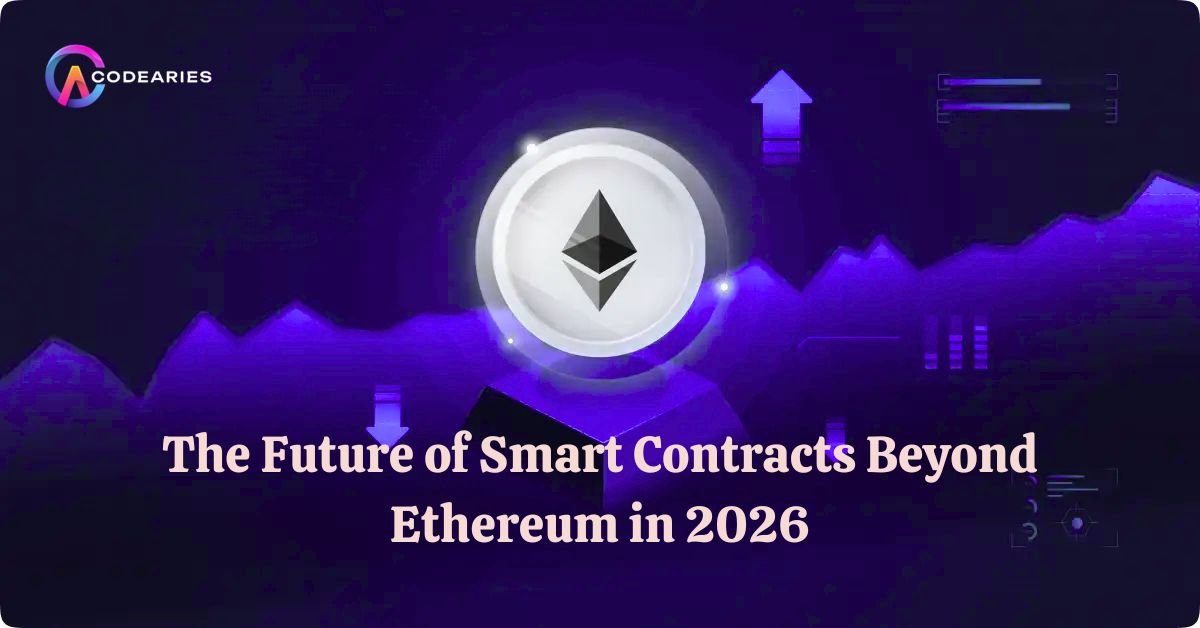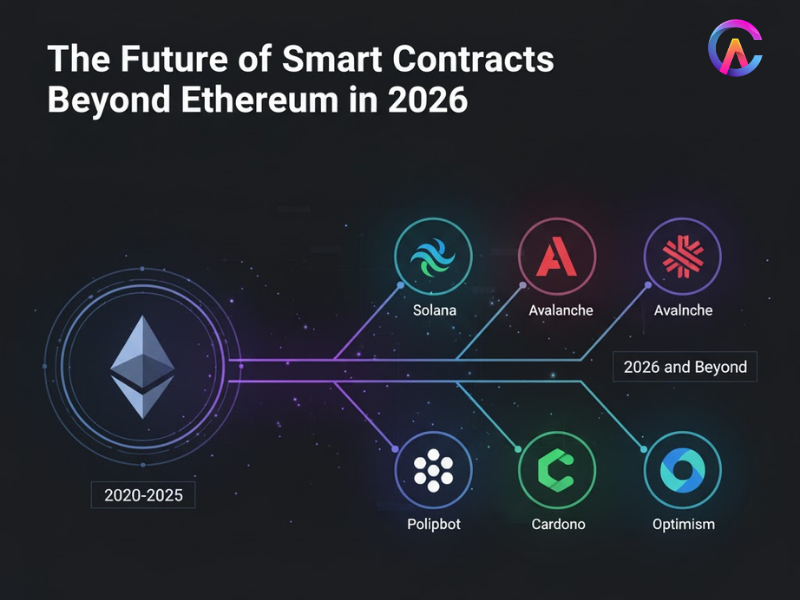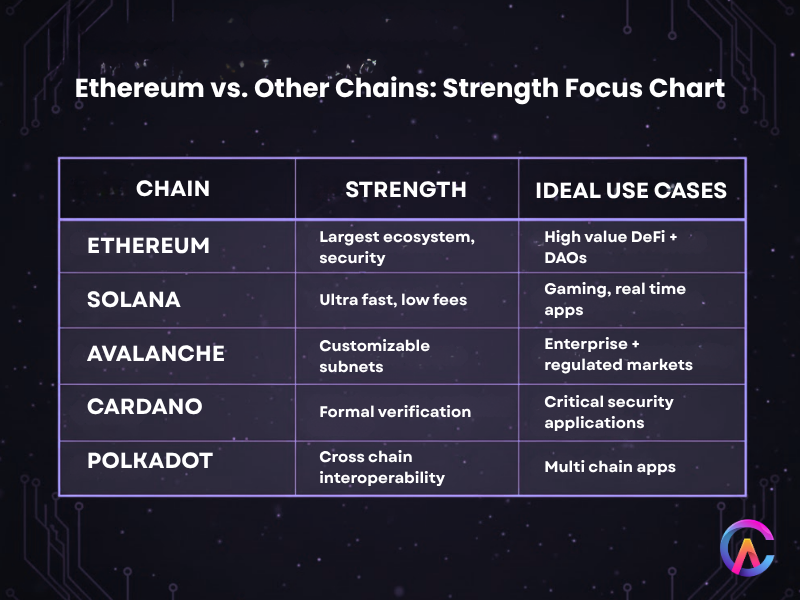
Smart contracts are changing how the digital world operates. They provide transparency, automation, and trustless interactions for many areas, including finance, gaming, supply chain, and healthcare. For years, Ethereum has been the leading smart contract platform, driving the rapid growth of DeFi, NFTs, tokenization, and more. However, as technology and the market progress, 2026 will see smart contracts move beyond Ethereum and thrive in a growing multichain ecosystem. What will the next stage of smart contracts look like outside of Ethereum? How will new platforms, frameworks, and trends redefine possibilities in business, security, and user experience?
Ethereum’s Ongoing Evolution and Its Limits
Ethereum is still the largest and most widely used smart contract platform. The network’s updates, like Ethereum 2.0 and proto danksharding, are improving scalability, security, and energy efficiency. The transition to Proof of Stake, lower gas fees, and advanced Layer 2 solutions like zk rollups, optimistic rollups, and danksharding will help Ethereum scale toward widespread use, potentially handling 100,000 transactions per second. New data structures, such as Verkle trees and stateless clients, will make running Ethereum nodes easier and more efficient.
Yet, Ethereum has limitations. High transaction fees and network congestion can be problematic, especially during peak times. The ecosystem also faces increased regulatory scrutiny, and as competition grows, other blockchains are starting to attract developers and users with their own unique advantages.
The Rise of Multichain Smart Contract Platforms
By 2026, the era of Ethereum being the sole playground for smart contracts will be gone. New platforms are finding their niches based on scalability, programmability, governance, or native interoperability.
Here are the leading smart contract ecosystems that are growing quickly:
- Solana: Fast transactions, low fees, and quick confirmation times are attracting gaming and real time trading projects.
- Avalanche: Known for its rapid consensus, customizable subnets, support for multiple virtual machines, and highly adaptable DeFi platforms.
- Polkadot and Cosmos: These pioneers focus on cross chain connectivity, enabling assets and data to flow freely between blockchains while supporting strong on chain governance.
- Cardano: This platform emphasizes security, academic rigor, self governance, and an emerging DeFi ecosystem.
- Algorand, Near, Tezos: These chains offer high throughput, eco friendliness, and unique programming environments with new staking and governance models.
- Layer 2 Networks: Base, Optimism, Arbitrum, and zkSync are Layer 2 solutions that enhance Ethereum’s capabilities while also serving as solid competitors.
In 2026, developers will view protocol choices not as a zero sum game but as tools for different markets and use cases.

Key Innovations Defining the Future of Smart Contracts
- Cross Chain Interoperability: The biggest advancement is smart contracts that operate across networks. Protocols like Polkadot, Cosmos, and specific bridges allow for composable DeFi, interoperable NFTs, and expanded liquidity.
- Formal Verification and AI Code Generation: Platforms such as Cardano focus on formal proofs for important contracts, while generative AI and large language models help convert business logic into secure smart contract code.
- Modular and Composable Architectures: New frameworks enable developers to reuse contract logic as plug and play modules, breaking monolithic code into secure microservices for greater flexibility and easier audits.
- On Chain Governance and Upgradability: Modern chains now integrate native voting, DAOs, upgradeable modules, and treasury management, reducing protocol risk while promoting rapid innovation.
- Privacy Preserving Contracts: Zero knowledge proofs, confidential computing, and encrypted state contracts from projects like Secret Network and zkSync are opening doors to private DeFi asset management and regulated applications.
- Integration with Off Chain AI IoT and Real World Data: Next gen oracles and secure computing platforms incorporate real world data and AI models into contracts, automating payments, insurance, supply chain logic, and more.
The Business Value of Expanding Beyond Ethereum
- Lower Costs and Faster Execution: New blockchains are competing on speed and cost, making smart contracts practical for high volume applications, payment streaming, or global gaming.
- Greater Customization: New platform designs allow for custom virtual machines, programming languages, and economic models.
- Resilience to Outages or Censorship: Multichain deployments help ensure that business logic and data survive attacks, congestion, or geopolitical issues.
- Broader Ecosystem Reach: Operating across networks opens doors to new audiences, liquidity, and developer talent, which is crucial for scaling.

Choosing the Right Platform in 2026
In this multichain environment, success relies on clearly matching use cases to the right platform. Highmfrequency games or on chain AI might lean towards Solana or Avalanche. Regulated DeFi and composable DAOs could thrive on Polkadot or Cosmos. Projects needing formal verification or eco credentials may choose Cardano or Algorand. Many businesses will adopt a multichain strategy, deploying different features across Layer 1 and Layer 2 chains and using bridges or dApp aggregators to create a unified user experience.
The Path Forward for Smart Contracts
By 2026, smart contracts will prioritize interoperability, modularity, and security just as much as they do any single chain’s scale. This shift will create new models in finance, insurance, digital identity, supply chain, healthcare, and entertainment, each leveraging the best features of multiple blockchains based on their needs for risk, speed, privacy, and innovation.
Developers and businesses that embrace this cross chain era and select appropriately sized platforms for each workload will receive the greatest benefits.
How Codearies Empowers You in the Multichain Smart Contract Era
At Codearies, we lead in smart contract innovation and help businesses move beyond Ethereum to thrive in a multichain world.
Our services include:
- Multichain strategy consulting to match your needs with the right protocols across Layer 1, Layer 2, and sidechains.
- Complete smart contract development across Ethereum, Solana, Avalanche, Polkadot, Cosmos, Cardano, and other major platforms.
- Modular contract architectures that enhance flexibility, security, and efficient audits
- Custom AI powered tools for rapid code generation, formal verification, and upgradability.
- Cross chain bridges and interoperable dApps that create a unified user experience and broaden market reach
- Security audits, compliance controls, and ongoing monitoring to ensure robust resilience.
- Training and enablement programs to prepare your teams for the future of blockchain.
Partner with Codearies to harness the full power of next generation smart contracts and create solutions that are future proof, interoperable, and ready for global growth.
Frequently Asked Questions
Q1: Which blockchains should I use beyond Ethereum?
We provide guidance based on your needs, considering speed, cost, regulatory fit, security, and ecosystem reach to recommend the best chains or hybrid models.
Q2: Can Codearies build smart contracts that work across multiple networks?
Yes, our solutions for cross chain and bridging unify assets and actions across Ethereum, Solana, Avalanche, Polkadot, Cosmos, and more.
Q3: How can I make sure my smart contracts are secure as the ecosystem changes?
We apply formal verification, modular design, and frequent audits using both automated and manual methods to keep your code safe.
Q4: Will AI really help with smart contract development?
AI now plays a central role in rapid prototyping, code translation, and risk analysis, significantly speeding up development cycles and reducing errors.
Q5: What ongoing support do you provide after launch?
We offer continuous monitoring, upgrades, compliance checks, integration of new chains, and dedicated troubleshooting to keep your contracts current and effective.
For business inquiries or further information, please contact us at


